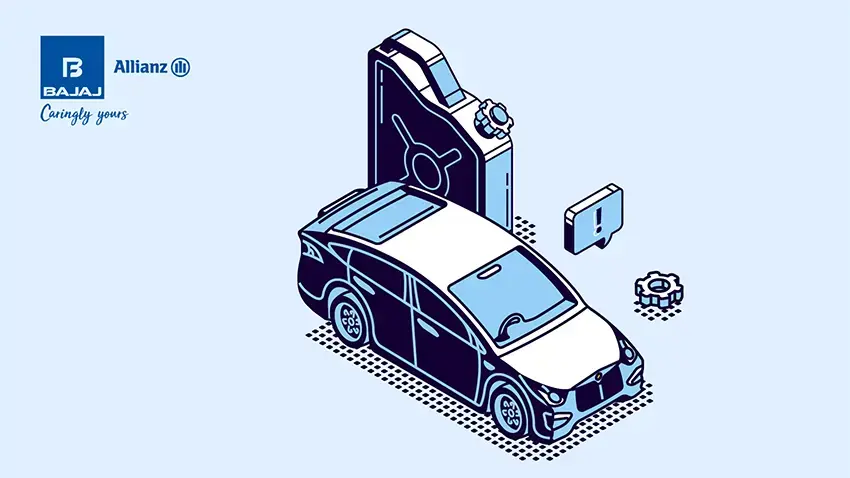In FY 2021-22, more than 4 million used cars were sold in India alone
[1]. Going for a used car may be more economical than going for a new car, due to factors such as fuel prices, taxes, and maintenance costs. While going for a used car may not burn a hole in your pocket, it is important to understand how the value of a used car is determined, and how it can impact the value of your
car insurance.
Used Car Valuation: Understanding Its Definition
Depreciation is defined as the reduction in the vehicle’s value with time. When a car is purchased, its value starts to depreciate the moment it is driven off from the showroom. Depreciation has a direct impact on the compensation received from a claim. Higher depreciation means lower compensation. A used car will have a depreciated value when it is on the market, which might make it cheaper for you to purchase. But a used car bought at a lower price might fetch you lesser value if you were to resell it. If the used car is up to 3 years old, the market value will be higher at the time of resell, whereas a car older than 5 years may go for a lower price.
Used Car Valuation: Factors Affecting It
It is important to understand the factors affecting the valuation of a used car before your purchase one:
- Depreciation
Generally, most used cars in the market tend to be older than 3-5 years. For a vehicle 5 years and older, the depreciated value is adjudged to be 50%. This means that the vehicle is priced lower than a vehicle only 2-3 years old. This difference may attract you towards a lower priced vehicle. But this impacts the amount you may get at the time of claim settlement or at the time of sale of vehicle.
- Driving History
If the used car has been heavily damaged and repaired in the past, it can drastically affect the price of the car. A history of repeated accident/s can also affect the internal parts of the car, which can cause problems in the future if you were to buy it. At the time of purchase, make sure you check the service and maintenance record of the car.
- Distance Driven
The total distance for which the car has been used is a major deciding factor in its pricing. Many sellers often demand a higher price for a car with too many kilometers on its odometer. But for cars which have been used a lot, they tend to fetch a lower price. Such used cars can face problems with functionality, which can lead to frequent repairs. There may be exceptions though, where classic models that have been used a lot tend to fetch a higher price due to the model.
- Model Of The Car
If the model of the car you are planning to purchase is discontinued, it can cause problems at the time of servicing. A discontinued car model means lack of availability of spare parts. You may have to rely on local and duplicate parts, especially if the car gets heavily damaged and some parts need to be replaced.
Relation Between Used Car Valuation And Car Insurance
The value of your car which you declare to your insurer is known as Insured Declared Value (IDV). The IDV of the car is decided on various factors, including the age of the car, and its depreciation value. At the time of claim settlement, the compensation amount is calculated taking the IDV into consideration. If the seller has priced the car at a lower price, you might end up declaring the same price as the IDV of your car to your insurer.*
If the car were to get damaged, your
second hand car insurance provider will compensate you based on the IDV you provided. This means that the compensation amount will be much lower than the actual amount you should get. Additionally, the type of coverage, the registered location, and the engine type of the car also affects the price of the insurance.*
Read More: Insured Declared Value (IDV) In Motor Insurance: A Complete Guide
Tips To Help You Make An Informed Decision
With these two tips, you can buy a used car which suits your criteria without any problems:
- Take assistance of the used car valuation calculator. With this calculator, you can check the actual market value of the car you are planning to purchase. If the price being quoted is lower or higher than the current market value, it will impact your IDV and the price of your car insurance. *
- The NCB belongs to the owner and not the vehicle. If your previous policy had an NCB in it, you can transfer the NCB to the new policy. Your previous insurer will issue a certificate. This certificate can be used to transfer the NCB to the policy issued by the new insurer. Sometimes, insurers offer a reduced premium in the event of a transfer of NCB. This is subject to the conditions of the insurer and is completely up to their discretion.
Conclusion
If you are contemplating on purchasing a used car, do remember the pointers mentioned above to select a car which is correctly priced, is functioning properly, and has an operational policy. You can always buy your own policy if you wish to. Use the
car insurance premium calculator to get a quote for the policy you wish to purchase.
*Standard T&C apply
Insurance is the subject matter of solicitation. For more details on benefits, exclusions, limitations, terms, and conditions, please read the sales brochure/policy wording carefully before concluding a sale.
 Service Chat:
Service Chat: 

